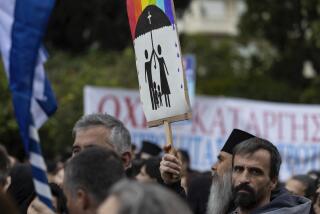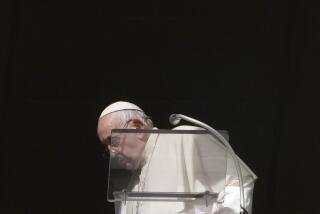Pontiff Deplores Repression of Religion in Soviet Bloc
- Share via
HELSINKI, Finland — Gazing east from Finland across Europe’s ideological frontier, Pope John Paul II on Monday lamented government repression of religious liberties in Eastern Europe and the Soviet Union as impediments to regional peace and development.
The visiting pontiff chose the conference hall where the Helsinki accords with their human rights provisions were signed in 1975 for his policy address arguing that a shared Christian heritage should be a powerful catalyst for unity throughout Europe.
“Religious freedom can exist in various social systems. What the churches ask for is that religious life should not be denied the freedom it needs,” John Paul stated in an English language address to a blue-ribbon audience of government officials, diplomats, intellectuals, scientists and businessmen.
The Helsinki accords--signed by 32 European nations including the Soviet Union as well as the United States, Canada and the Vatican--established principles for peaceful cooperation, including promises to guarantee freedom of thought and religion, the Pope noted.
“European nations have become more and more aware that the honest confrontation of ideas and convictions has been an indispensable condition for their overall development,” the pontiff asserted.
‘Regrettable’ Cases of Denial
John Paul, however, deplored “the gap between the stated principles and the grave hindrances faced by some communities of believers in Europe.” He noted that he had in the past denounced “regrettable cases of the total denial of religious freedom to communities of Eastern Rite Catholics, which lost even the right to exist within the new postwar political and juridical structures.”
The Pope’s reference was to the Soviet Ukraine, where an estimated 2 million underground Catholics in communion with Rome practice a faith that has been officially proscribed since Josef Stalin’s day.
Repeated Ukrainian requests to the Soviet government for legalization of the church as part of President Mikhail S. Gorbachev’s program of reform, known as perestroika, have been thus far unavailing. The Ukraine is certain to be a key point of friction during Gorbachev’s expected meeting with John Paul at the Vatican later this year.
Asked by reporters here Monday about a possible papal visit to Moscow, Vatican Secretary of State Cardinal Agostino Casaroli replied, “Clearly the possibility exists, but I personally don’t think it will come any time soon.”
John Paul, the most traveled Pope in history, has said he would like to visit the Soviet Union but at the same time has made clear he would not go without being able to visit Ukrainian Catholics, whom the government regards as part of the officially sanctioned Russian Orthodox Church.
‘Serious Difficulties’
Expressing satisfaction at the expansion of religious liberties in Central and Eastern Europe since the Helsinki agreement, John Paul noted that “serious difficulties” still exist in some countries.
“I am thinking especially of those Catholic communities forced to live in underground existence; of young people discriminated against in their studies or careers because of their religious beliefs, and of dioceses deprived of their bishops,” John Paul said.
The Czechoslovak government, in particular, has been slow to allow replacement for aging bishops, and Catholics are sometimes stigmatized in other officially atheist societies of Eastern European. Under John Paul, the Vatican has patiently built bridges to the East Bloc, particularly to Hungary, which the Pope will visit in 1991, and Poland, where the church is the principal bulwark of the Solidarity union.
John Paul’s keynote address came on the fifth day of his Nordic tour after a Mass in which small delegations from the neighboring Soviet republic of Estonia were sprinkled among worshipers from Finland’s 4,200-member community of Catholics.
“The idea that religion is a form of alienation is no longer fashionable, because, fortunately, the leaders of the (European) nations and people themselves have come to realize that believers constitute a powerful factor in favor of the common good,” John Paul told the audience.
Religious freedom is consistently near the top of the 69-year-old, Polish-born Pope’s agenda. With it, on a visit to rich and nominally Lutheran but staunchly secular Nordic countries, have come repeated papal calls for stronger Christian ecumenism, better environmental protection and injunctions against spirit-sapping materialism.
“Religious life is not threatened merely by vexing restrictions,” John Paul warned Monday. “It can also be threatened by the spread of false values--such as hedonism, power-seeking, greed--which are making headway in various countries and which in practice stifle the spiritual aspirations of large numbers of people.”
The Pope, who came to Finland on Sunday after stops in Norway and Iceland, continues his Nordic pilgrimage today in Denmark. He returns to Rome on Saturday after a final stop in Sweden.
More to Read
Sign up for Essential California
The most important California stories and recommendations in your inbox every morning.
You may occasionally receive promotional content from the Los Angeles Times.










